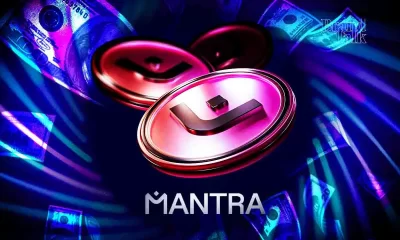Law and Order
Crypto-Backed Candidates Patronis and Fine Win Key Florida Seats
Published
2 weeks agoon
By
admin

Republican candidates Jimmy Patronis and Randy Fine secured victories in Florida’s special congressional elections Tuesday night, extending the GOP’s narrow House majority with significant backing from crypto industry super PACs.
Fine captured 56.7% of the vote in Florida’s 6th District against Democrat Josh Weil, while Patronis won Florida’s 1st District with 57% against Gay Valimont.
Both campaigns received substantial support from Defend American Jobs, a Republican-focused crypto PAC operating within the broader Fairshake political funding network.
Those wins represent yet another victory for crypto industry interests.
Patronis and Fine “have shown a deep commitment to advancing pro-growth policies and ensuring the U.S. leads the world in crypto and digital asset innovation,” Defend American Jobs said in an emailed statement to Decrypt after the results.
“Their election is a win for jobs, innovation, and American leadership.”
While Fine’s 14-point win margin shows a significant contraction from President Trump’s 30-point advantage in the same district last November, it’s worth mentioning that Weil had a $10 million war chest compared to Fine’s roughly $1 million.
In January, Fairshake raised over $116 million, which has been directed toward spending for the 2026 midterms, Decrypt reported.
Fairshake is affiliated with Defend American Jobs and Protect Congress. By the time the 2024 elections began, the network had invested some $133 million toward its cause.
Those efforts have helped secure GOP seats across the board in recent months and are intended to win favorable regulatory support in the years ahead.
With crypto legislation on stablecoins and market structure pending in Congress, the two new electoral wins could help solidify the slim Republican majority needed to advance pro-crypto bills.
Leading firms and leaders in the space—including exchange operator Coinbase, blockchain payments company Ripple, tech investor Andreessen Horowitz, and Gemini co-founders Cameron and Tyler Winklevoss—have all donated to Fairshake’s efforts.
Edited by Sebastian Sinclair
Daily Debrief Newsletter
Start every day with the top news stories right now, plus original features, a podcast, videos and more.
Source link
You may like


Crypto markets ‘relatively orderly’ despite Trump tariff chaos: NYDIG


Fartcoin ‘Hot Air Rises’ — $1.50 Just A Whiff Away


What happened to the RWA token?


Crypto Strategist Sees Solana-Based Memecoin Surging Higher, Says One AI Altcoin Flashing Strong Chart


Mantra Team Responds As The OM Token Price Crashes Over 80% In 24 Hours


This Week in Crypto Games: Gaming Tokens Crash Out, Eve Frontier Opens Up
Law and Order
From the Crypto Trenches to the Hill: Why Solana Is Making a Big Push in Washington
Published
15 hours agoon
April 13, 2025By
admin

When Solana debuted in 2020, it set out to dominate decentralized finance. Now, five years and more than eight billion transactions later, supporters of the so-called Ethereum killer have assumed a far more ambitious undertaking: conquering the halls of Congress.
However, advocating for Solana on Capitol Hill—where DeFi still suffers from its association with money launderers and hackers, despite a growing embrace of crypto—won’t be easy.
Enter the Solana Policy Institute.
Founded in March, the policy arm of the second-largest layer-1 network by total-value locked aims to represent the many pseudonymous coders and founders building on Solana and other blockchains within the sprawling DeFi sector. DeFi is a catchall term that represents a wide array of crypto-driven, autonomous financial services that do not require centralized intermediaries like banks.
The nonprofit will be helmed by President Kristin Smith—the outgoing Blockchain Association CEO—and CEO Miller Whitehouse-Levine, the one-time DeFi Education Fund Director. They’re two star lobbyists equally fluent in D.C. discourse and the slang of the crypto trenches.
Together, they are setting out to reform the DeFi sector’s shadowy reputation and to ensure the space remains top of mind among policymakers.
“A lot happens in the world, and Congress ought to be responsive to what is happening,” Whitehouse-Levine told Decrypt.
“We want to make sure that those in D.C. policy-making circles and everyone advocating for their interests here are aware of all the cool stuff happening on Solana and the possibilities of development on-chain,” he added.
The SPI is planning to organize a spate of “fly-ins,” springing its developers, founders and other builders from the trenches and sending them to Capitol Hill to educate lawmakers, according to Whitehouse-Levine.
The fly-ins represent a major ramping up of the layer-1’s presence on Capitol Hill. For years, advocates for Solana and other leading blockchains have convened for monthly phone calls on DeFi policy, Whitehouse-Levine said. But, those efforts haven’t always translated to invitations to mingle with lawmakers.
“There is no substitute for the folks actually building these things coming to Washington, explaining what they’re trying to accomplish to policymakers and showing policymakers what they’re building,” Whitehouse-Levine said.
It remains unclear how SPI intends to fund its education push, however. Whitehouse-Levine did not disclose the amount of money the Solana Policy Institute has in its coffers, and he declined to identify the source of those funds.
A source familiar with the matter told Decrypt the institute intends to make a major funding announcement soon, however.
Meanwhile, three sources in the Solana ecosystem told the publication Unchained on Friday they understood the organization to be supported with funding from the Solana Foundation.
The Solana Policy Institute is not officially associated with the Switzerland-based Solana Foundation, which supports the adoption and growth of the Solana network. However, their mandates are largely aligned.
The Solana Foundation did not respond to Decrypt’s repeated requests for comment on the matter.
DC’s growing crypto embrace
SPI’s founding comes just months after crypto lobbyists helped elect the most pro-crypto Congress and administration yet, accelerating the industry’s efforts to soften stigmas around digital assets stateside.
But even as lawmakers largely embrace Web3 firms under pro-crypto U.S. President Donald Trump, some have kept decentralized finance players at arm’s length. The sector’s pseudonymous founders, meme coin creators, and “shadowy super coders” are largely untrained in the kind of politicking that their corporate-coded centralized exchange counterparts have mastered to advance their interests on Capitol Hill.
They also have splashed less cash on courting regulators and lawmakers. In 2024, corporate crypto titans such as Coinbase, Ripple Labs and investment firm Andreessen Horowitz ranked as the top three donors to pro-crypto super PAC Fairshake, allocating more than $150 million combined to the group, according to OpenSecrets data.
Meanwhile, donors linked to Solana, which ranked as the PAC’s 20th-largest donor and one of its biggest DeFi contributors, gave just $25,000 to the group last year, the same data shows.
Those factors may have kept DeFi leaders out of some important decision-making rooms. In March, the Trump administration hosted more than a dozen crypto company leaders at its inaugural Crypto Summit in Washington D.C. Just a few of the roughly two dozen invitees represented DeFi projects.
Still, SPI founder Whitehouse-Levine is confident that the Solana Policy Institute, led by experts like Smith—a Fortune 40 Under 40 in Government and Politics alumna and top lobbyist, according to the U.S. politics-focused newsroom The Hill—will help DeFi enter more conversations on the Hill.
“She is an icon in crypto policy, and…as far as I’m concerned, the foundation of the industry’s efforts as they have been built over the last eight years,” he said.
‘Meme coin casino’ makeover
But Solana’s reputation is not necessarily as polished as that of Smith’s.
Founded in 2020, the network has in part attracted a growing user base over the last year-plus through its so-called meme coin casino, where it’s among the cheapest and easiest places to launch a token that could just as rapidly skyrocket and then plunge in value.
It’s also an anything-goes playground where people set themselves on fire or fake their own deaths to pump tokens with no intrinsic utility, while heads of state can rug-pull unsuspecting traders via social media.
That spate of antics poses a major risk to the platform’s ability to connect with regulators and legislators, but Whitehouse-Levine believes good policy can curb the impact of those incidents and help the ecosystem reform its image.
“First things first, we can’t have people setting themselves on fire,” he told Decrypt. “Like, I can’t believe we’re actually saying that out loud.”
“There’s been multiple speculative frenzies in the history of crypto, and to the extent that [a]clear regulatory framework can help bring that in, that’s in everyone’s interests,” Whitehouse-Levine added.
However, to get that kind of legislation passed, it’s important that developers and legislators take the time to understand one another with the help of go-betweens like Whitehouse-Levine, Smith, and other policy experts, DeFi Education Fund Executive Director Amanda Tuminelli—who will be working closely with SPI on DeFi-focused policy initiatives—told Decrypt.
“We’re all trying to reach out directly to developers and serve as a bridge between DeFi developers and the Hill,” Tuminelli said.
“It’s very important that we get clear law on the books while we can, [and] while Congress seems like they’re in a place where that could happen,” she said, adding that she’s seen in recent months an increase in securities regulators and lawmakers holding meetings on issues that impact DeFi developers.
“I think people are recognizing that opportunity and putting resources behind it,” Tuminelli added.
Edited by James Rubin
Daily Debrief Newsletter
Start every day with the top news stories right now, plus original features, a podcast, videos and more.
Source link
Law and Order
Crypto Competitors Grayscale and Osprey Settle Two-Year Tussle Over Bitcoin ETFs
Published
3 days agoon
April 11, 2025By
admin

Digital asset managers Grayscale Investments and Osprey Funds have reached a settlement agreement after their long-drawn legal dispute over marketing practices.
A motion filed with the Connecticut Appellate Court on April 9 shows the parties are looking at 45 days to finalize settlement documentation after Osprey appealed a February decision favoring Grayscale.
“Soon after this appeal was filed, the parties reached a settlement of this case,” a copy of the motion first uploaded by Law360 reads. Grayscale and Osprey would then need to “finish documenting the settlement” and carry out the terms before the appeal can be pulled.
The lawsuit, filed in January 2023, centered on allegations that Grayscale misled investors about the prospects of its Bitcoin Trust (GBTC) converting to an exchange-traded fund.
Fairfield-based Osprey, which operates its own Bitcoin trust albeit with a smaller market share, claimed Grayscale violated Connecticut’s Unfair Trade Practices Act (CUTPA) by allegedly deceptive marketing.
Court records show the litigation with Osprey intensified after Grayscale received SEC approval to “uplist” and convert its Bitcoin Trust to an ETF in January 2024, following a protracted battle with the regulator.
Osprey subsequently amended its complaint, arguing that Grayscale misrepresented its progress toward ETF conversion. Osprey is still working to convert their OBTC to an ETF.
Superior Court Judge Mark Gould granted summary judgment to Grayscale on February 7, 2025, ruling that CUTPA did not apply to securities cases.
That judgment came after over two years of legal proceedings, which included counterclaims by Grayscale alleging similar unfair practices by Osprey. These counterclaims were voluntarily dropped before the summary judgment, the case history shows.
It’s worth noting that before the February ruling, Osprey had attempted to settle the case in July 2024 for roughly $2 million, but Grayscale declined that offer.
Financial terms and other conditions of the current settlement agreement have not been disclosed, and it remains unclear whether the agreement includes any admission of liability by either party.
Representatives from both companies have not issued public statements regarding the current settlement terms.
Decrypt has reached out to Grayscale and Osprey but did not receive a response by press time.
Edited by Sebastian Sinclair
Daily Debrief Newsletter
Start every day with the top news stories right now, plus original features, a podcast, videos and more.
Source link
Law and Order
Block Agrees to $40M NYDFS Penalty Over Lackluster Compliance Program
Published
4 days agoon
April 10, 2025By
admin

Block, Inc. has agreed to a $40 million settlement with the New York Department of Financial Services (NYDFS) for “significant failures” in its anti-money laundering compliance program, the Wall Street regulator announced on Thursday.
The company led by Jack Dorsey has agreed to retain an independent monitor after violating the Department’s money transmitter and virtual currency rules, the NYDFS added.
The NYDFS found that Block’s company had “inadequate customer due diligence” and failed to implement systems sufficient for preventing money laundering and illicit activity.
Block’s services were “vulnerable to criminal exploitation,” the NYDFS said, arguing that Block’s “lax treatment” of Bitcoin transactions allowed largely anonymous transactions to evade scrutiny.
“Compliance functions must keep pace with company growth or expansion,” NYDFS Superintendent Adrienne A. Harris said in a statement.
With its so-called BitLicense, Block’s Cash App had been regulated under the NYDFS as a virtual currency business since 2018.
Last year, Cash App ended its support for free peer-to-peer (P2P) Bitcoin payments, while leaning into other cryptocurrency services that users have gravitated toward.
Edited by James Rubin
Daily Debrief Newsletter
Start every day with the top news stories right now, plus original features, a podcast, videos and more.
Source link
Michael Saylor Teases New Bitcoin Buy After Strategy’s $7.69 Billion Q1 BTC Buying Spree

Crypto markets ‘relatively orderly’ despite Trump tariff chaos: NYDIG

Fartcoin ‘Hot Air Rises’ — $1.50 Just A Whiff Away

What happened to the RWA token?

Crypto Strategist Sees Solana-Based Memecoin Surging Higher, Says One AI Altcoin Flashing Strong Chart

Mantra Team Responds As The OM Token Price Crashes Over 80% In 24 Hours

This Week in Crypto Games: Gaming Tokens Crash Out, Eve Frontier Opens Up

Commerce Secretary Lutnick walks back tariff relief on electronics

Gold ETF Inflows Hit Three-Year High as PAXG, XAUT Outperform Wider Crypto Market

Israel’s New Study Shows 51% Of Public Is Interested In Adopting CBDC (Digital Shekel) – Is That So?

Solana Price Eyes Breakout Toward $143 As Inverse Head & Shoulders Pattern Takes Shape On 4-hour Chart

Crypto malware silently steals ETH, XRP, SOL from wallets

Binance Executives Met With US Government Officials To Discuss Easing of Regulatory Supervision: Report

Michael Saylor Hints At Another MicroStrategy Bitcoin Purchase, BTC Price To Rally?

From the Crypto Trenches to the Hill: Why Solana Is Making a Big Push in Washington

Arthur Hayes, Murad’s Prediction For Meme Coins, AI & DeFi Coins For 2025

Expert Sees Bitcoin Dipping To $50K While Bullish Signs Persist

Aptos Leverages Chainlink To Enhance Scalability and Data Access

Bitcoin Could Rally to $80,000 on the Eve of US Elections

Crypto’s Big Trump Gamble Is Risky

Institutional Investors Go All In on Crypto as 57% Plan to Boost Allocations as Bull Run Heats Up, Sygnum Survey Reveals

Sonic Now ‘Golden Standard’ of Layer-2s After Scaling Transactions to 16,000+ per Second, Says Andre Cronje

Ripple-SEC Case Ends, But These 3 Rivals Could Jump 500x

Has The Bitcoin Price Already Peaked?

A16z-backed Espresso announces mainnet launch of core product

The Future of Bitcoin: Scaling, Institutional Adoption, and Strategic Reserves with Rich Rines

3 Voting Polls Show Why Ripple’s XRP Price Could Hit $10 Soon

Xmas Altcoin Rally Insights by BNM Agent I

Blockchain groups challenge new broker reporting rule

I’m Grateful for Trump’s Embrace of Bitcoin
Trending

 24/7 Cryptocurrency News5 months ago
24/7 Cryptocurrency News5 months agoArthur Hayes, Murad’s Prediction For Meme Coins, AI & DeFi Coins For 2025

 Bitcoin3 months ago
Bitcoin3 months agoExpert Sees Bitcoin Dipping To $50K While Bullish Signs Persist

 24/7 Cryptocurrency News3 months ago
24/7 Cryptocurrency News3 months agoAptos Leverages Chainlink To Enhance Scalability and Data Access

 Bitcoin5 months ago
Bitcoin5 months agoBitcoin Could Rally to $80,000 on the Eve of US Elections

 Opinion5 months ago
Opinion5 months agoCrypto’s Big Trump Gamble Is Risky

 Bitcoin5 months ago
Bitcoin5 months agoInstitutional Investors Go All In on Crypto as 57% Plan to Boost Allocations as Bull Run Heats Up, Sygnum Survey Reveals

 Altcoins2 months ago
Altcoins2 months agoSonic Now ‘Golden Standard’ of Layer-2s After Scaling Transactions to 16,000+ per Second, Says Andre Cronje

 Price analysis5 months ago
Price analysis5 months agoRipple-SEC Case Ends, But These 3 Rivals Could Jump 500x


